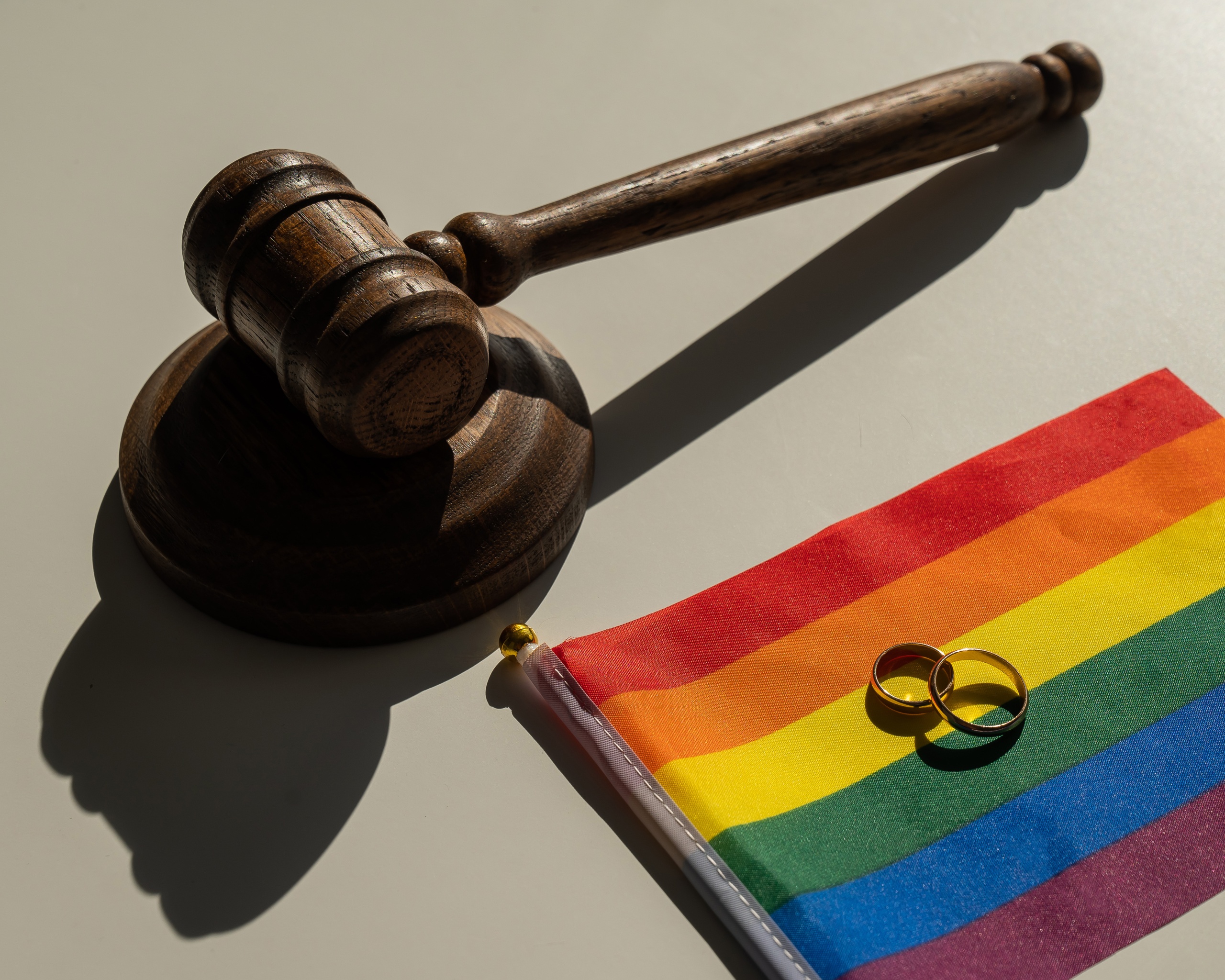A new chapter in the history of the fight for equality was written on June 26, 2015, when the Supreme Court of the United States decided on the case of Obergefell v. Hodges. This landmark decision legalized same-sex marriage across all 50 states, a monumental victory for the LGBTQ+ community that championed the idea of “love is love.” The ruling was a significant stride forward, not only from a standpoint of human rights and social justice but also from a legal perspective. The decision served to ensure that same-sex couples were afforded the same legal protections and benefits as their heterosexual counterparts, covering aspects such as health insurance, tax exemptions, and a plethora of other benefits.
However, with this victory emerged a new set of challenges. Legalizing same-sex marriage meant that same-sex divorce also became a reality. While the end of any marriage can be a complicated process, the intricacies involved in same-sex divorces are unique and largely uncharted. They stretch the existing legal frameworks and challenge preconceived notions about marriage and divorce.
Many might assume that the legalization of same-sex marriage instantly equated to an equivalent divorce process for same-sex and heterosexual couples. However, the reality is far more nuanced. The path to divorce for same-sex couples is often littered with complex issues, from child custody battles and asset division to battles with both state and federal laws.
The complexities emerge from a patchwork of laws and regulations that vary significantly from state to state, some of which predate the legalization of same-sex marriage. These laws, created within the confines of a traditionally heteronormative understanding of marriage and family, do not always account for the realities of same-sex couples. The situation is further complicated by the fact that the history of these relationships often extends beyond the official date of marriage, and some were involved in domestic partnerships or civil unions prior to their legal marriage.
This article aims to delve into the depths of these complexities, exploring the unique challenges same-sex couples face in divorce proceedings and providing a roadmap for those seeking to navigate this labyrinth of same-sex divorce law.
Parental Rights and Same-Sex Divorce
A crucial factor that stands out prominently in same-sex divorce proceedings revolves around the issue of parental rights. The dynamics of establishing and protecting these rights for same-sex couples are fraught with complexities that heterosexual couples rarely encounter.
When a heterosexual couple conceives or adopts a child, parental rights are typically automatic for both partners. The legal framework implicitly recognizes the mother and the father as the child’s legal parents, granting them both rights and responsibilities towards the child.
However, the situation is vastly different for same-sex couples, particularly when the child is biologically related to one of the partners or was adopted before the legalization of same-sex marriage. In these cases, the non-biological or non-adoptive parent must take specific legal steps to establish their parental rights. This process can include second-parent adoption or obtaining a court order recognizing both partners as the child’s legal parents. If these steps are not taken, the non-biological or non-adoptive parent risks losing their parental rights in the event of a divorce.
The lack of established parental rights can have significant consequences during divorce proceedings. It can result in the non-biological or non-adoptive parent losing custody and visitation rights, disrupting the parent-child relationship. Therefore, understanding and securing parental rights is a critical first step for same-sex couples planning to have children or those who already have them.
Moreover, it’s important to note that parental rights don’t only entail privileges but also responsibilities, including financial support. In a same-sex divorce, the issue of child support may become complex if one partner has not legally established their parenthood. Despite possibly having shared in raising and nurturing the child, they might have no legal obligation to provide financial support if the legal relationship has not been established.
The resolution of child custody issues largely depends on state laws, which can vary significantly. In some states, courts have been proactive in recognizing the parental rights of both same-sex partners, even in the absence of a biological connection. However, not all states are as progressive, which can lead to complicated and emotionally distressing legal battles.
Navigating these legal challenges requires the guidance of legal professionals experienced in same-sex family law. However, the ideal solution would be comprehensive legislative reform that fully acknowledges the diverse nature of modern families and ensures equal rights and protections for all parents, regardless of their sexual orientation.
The Duration of Marriage and its Implications
The timing and legality of same-sex marriages present unique challenges when it comes to determining the duration of the marriage and its impact on divorce proceedings.
In most divorce cases, the length of the marriage plays a pivotal role in determining spousal support, property division, and the division of other assets. The longer the marriage, the more entwined the couple’s finances usually become. Additionally, a longer marriage might entail a larger alimony award, particularly if one spouse sacrificed their career or education to support the other or raise children.
However, same-sex marriages present an anomaly due to their relatively recent legal recognition. While same-sex marriage became legal across the United States in 2015 following the landmark Obergefell v. Hodges decision, many same-sex couples had been in committed relationships, often for many years, before the law acknowledged their unions.
For instance, consider a same-sex couple who have been together since 2005 but could only legally marry in 2015. On paper, their marriage is eight years old, yet their partnership spans over 18 years. This discrepancy can lead to substantial inequalities in divorce proceedings if only the legal duration of the marriage is considered.
Furthermore, the situation becomes even more complex when considering civil unions or domestic partnerships. Before the 2015 ruling, some same-sex couples entered into these legal arrangements as they were the only ones available to them. However, not all states consider the duration of a civil union or domestic partnership as part of the length of the marriage. This issue could result in one partner receiving a smaller share of assets or less spousal support than they would if the entire length of the relationship were considered.
It’s crucial for same-sex couples going through a divorce to be aware of these implications. Some states might consider the entire relationship duration, including cohabitation before legal marriage, while deciding on financial and asset divisions. However, this generally happens on a case-by-case basis and requires the couple to provide evidence of their long-term relationship, such as joint bank accounts or property ownership.
Given these complications, an experienced attorney specializing in same-sex divorce can provide invaluable guidance and help ensure a fair resolution. The legal landscape around same-sex divorce is continually evolving, so having a professional who keeps up-to-date with the latest changes is crucial. Moreover, with societal attitudes and laws gradually catching up to the realities of same-sex relationships, the hope is for a more equitable future where the duration of all marriages, same-sex or otherwise, are treated equally.
Differences Between State and Federal Laws
The distinctions between state and federal laws pose significant challenges in same-sex divorce cases. While the Obergefell v. Hodges ruling in 2015 federally legalized same-sex marriages, each state retains the power to dictate its laws surrounding family and divorce matters. Consequently, discrepancies between federal and state laws create a significant gray area, especially in states with lingering anti-LGBTQ+ legislation.
Federal laws set the foundation for recognizing same-sex marriages, allowing couples to access benefits like joint tax filing, social security survivor’s benefits, and federal employee health benefits, among others. However, the nitty-gritty of divorce proceedings, including child custody, property division, and alimony, are typically governed by state laws.
This divide can be particularly thorny when it comes to financial matters. For instance, certain federal regulations play a significant role in the division of property and other assets, especially those associated with taxes. But if the state’s laws differ or fail to acknowledge the nuances of same-sex marriages, it could lead to unequal outcomes.
One example is how state and federal laws handle marital assets in a divorce. Federal laws recognize retirement savings in a 401(k) or similar plan accumulated during a marriage as joint property, irrespective of whose name is on the account. However, the laws for dividing these assets in a divorce are primarily dictated by state laws. If a state’s laws are not fully congruent with federal law, it may create complications when dividing such assets in a same-sex divorce.
Similarly, some states may not recognize the full duration of a same-sex couple’s relationship if they were together before their marriage was legally recognized. This discrepancy can impact the division of assets and alimony, as these often depend on the length of the marriage.
Another critical area where state laws can impact same-sex divorce proceedings is child custody. The federal law mandates that states honor custody determinations made by other states under the Full Faith and Credit Clause. However, each state has its laws and procedures for determining child custody and visitation rights. In some states, non-biological parents in a same-sex marriage may face challenges in obtaining custody or visitation rights, especially if they did not legally adopt the child.
Furthermore, it’s crucial to remember that changes to the Supreme Court’s composition could influence the interpretation of federal laws concerning same-sex marriage and divorce. Recent years have seen a growing conservative majority in the court, leading to concerns about potential rollbacks of LGBTQ+ rights.
Navigating this patchwork of state and federal laws can be challenging for same-sex couples seeking a divorce. Therefore, employing the services of an attorney well-versed in same-sex divorce laws can be instrumental in ensuring a fair and equitable divorce process.
Threats to Same-Sex Marriage and Divorce
The historic Obergefell v. Hodges ruling gave same-sex couples nationwide the right to marry and subsequently divorce under the law. However, while this ruling represents a significant victory for the LGBTQ+ community, it also invited backlash from those opposing marriage equality. As the composition of the United States Supreme Court becomes more conservative, some same-sex couples fear that their right to marry and divorce may be under threat.
In a stark example, Supreme Court Justices Thomas and Alito have expressed opinions that honoring the Obergefell ruling might infringe on some individuals’ religious liberties. These comments sparked controversy and concern about the future of same-sex marriage rights. The justices drew attention to the case of the Kentucky county clerk who refused to issue a marriage license to a same-sex couple, citing her religious beliefs that marriage is a union only between a man and a woman.
While the Supreme Court did not take on this specific case, the justices’ commentary highlighted the potential for religious freedom arguments to challenge the Obergefell ruling. The potential for such challenges, combined with a more conservative Supreme Court, could place the legal protections same-sex couples currently enjoy in peril.
Moreover, although same-sex marriage is legal at the federal level, individual states retain significant control over marriage and divorce laws. States with a strong conservative or religious leaning might implement legislation that could complicate or create barriers for same-sex divorces, either through stricter requirements or by placing roadblocks that make the process more challenging.
Even beyond legal considerations, societal biases and misconceptions persist. For example, some individuals or companies may give same-sex couples a hard time when they try to access certain information or take advantage of certain benefits during the divorce process. These challenges can range from overt sexual orientation discrimination to more subtle forms of bias that can nonetheless make the divorce process more stressful and difficult.
Given these potential threats, it’s imperative that same-sex couples seeking a divorce obtain legal representation experienced in dealing with the complexities of same-sex divorce. Being aware of the potential challenges and being prepared to navigate them is an essential part of ensuring a fair and equitable divorce process.
Navigating the Process: Same-Sex Divorce in Practice
Navigating the process of divorce is a challenging ordeal for any couple. For same-sex couples, the complexity of the process can be compounded due to varying state laws, differences between state and federal laws, and the overall lack of precedent.
The divorce process begins with understanding the legal parameters within the state where the couple resides. States can have different requirements for divorce, such as residency or separation requirements, that must be met before a divorce petition can be filed. For example, many states mandate that couples must have resided in the state for a certain period before they can file for divorce. This can pose an issue for same-sex couples who were married in a state different from the one they currently reside in, especially if their current state of residence did not recognize same-sex marriages when they were married.
In addition to understanding state requirements, it’s critical to gather all pertinent financial and legal documents. These include pay stubs, tax records, financial accounts, investments, and other relevant paperwork. Accurate financial records are crucial, as they can influence decisions regarding spousal support, asset division, and, in cases involving children, child support calculations.
It is also important for same-sex couples to be aware of the possible length-of-marriage discrepancy. While a same-sex couple may have cohabitated and shared a life together for many years, the official duration of their marriage may be significantly shorter due to the legalization of same-sex marriage in 2015. This discrepancy can impact the division of assets and alimony decisions, potentially leaving one spouse disadvantaged. In some states, long-term cohabitation and shared finances can be used to argue for a longer union, but success varies case by case.
Child custody and visitation rights pose another area of complexity for divorcing same-sex couples, particularly if only one parent is legally recognized as the child’s parent. The nonlegal parent may face challenges in securing custody or visitation rights and may also be exempt from paying child support.
Furthermore, same-sex couples should be prepared to deal with potential biases during their divorce proceedings. Unfortunately, despite laws against such discrimination, biases and misconceptions about same-sex relationships and parenting can seep into the divorce process. Some same-sex couples may choose to settle their divorce case outside of court, through mediation, to mitigate these challenges. Mediation can offer a more flexible approach, allowing for more individualized solutions that take into account the unique challenges faced by same-sex couples.
Regardless of whether a same-sex couple chooses to settle their divorce in court or through mediation, having a trusted, experienced divorce lawyer is critical. A good attorney can provide guidance through the intricate process, ensuring that their clients’ rights are protected and their interests represented.
In conclusion, same-sex divorce, while legally similar to heterosexual divorce, comes with its own set of challenges. But with the right guidance and preparation, these challenges can be navigated effectively, ensuring a fair divorce process.




